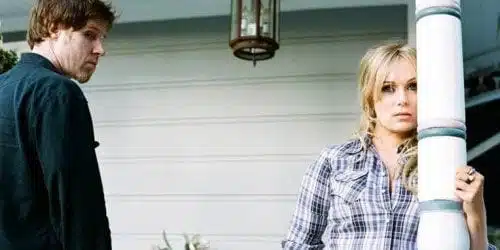
Mark Lanegan made a name for himself as the leader of Screaming Trees, one of the better grunge-era Seattle bands. After that, he built a substantial solo career around a sorrowful vision and a voice that sounds like it’s been weathered by a mixture of cigarettes, whiskey, and crypt dust. He’s also turned ears through his alliance with indie lothario Greg Dulli, as well as his stint with sludge-riffers Queens of the Stone Age. For her part, Isobel Campbell’s ethereal vocals helped define the lonely ennui and delicate folk of Belle & Sebastian. Somewhere along the line, to our benefit, the pair hit upon the idea of joining voices.
They’re hardly the first pairing to mix rough and tender voices, but there’s something indefinable in their sandy-meets-airy mix that just works better than most. Despite the fact that you’d have to concoct something along the lines of a Tom Waits/Astrud Gilberto duet to find voices so seemingly at odds with one another, Campbell and Lanegan are highly sympathetic partners. This was quickly apparent on the duo’s 2006 debut, Ballad of the Broken Seas, where Lanegan and Campbell toyed with styles ranging from acoustic folk to country to country blues to moonlit jazz. The disc held several highlights, even if it occasionally sounded like Campbell and Lanegan were content with just the sound of their voices intertwining rather than worrying about making each and every song distinct.
That’s a minor problem with Sunday at Devil Dirt as well. It’s not for lack of a strong start, though. “Seafaring Song” wraps Lanegan’s fine-grit rasp in strings and concertina, evoking images of a grizzled old sailor staring out at gray waves and the dangers of past days. “The Raven” quickly transcends an iffy beginning as an Edgar Allen Poe homage to pick up some satisfying, epic-sounding steam. “Who Built the Road” wafts along on a bed of classic-sounding strings, punctuated by images of dark angels and hellfire. The album, though, hits its sweet spot with “Come on Over (Turn Me On)” and “Back Burner”. For its part, the bluesy “Come on Over (Turn Me On)” sounds like Campbell and Lanegan found a lost Etta James track and kept it for themselves. “Back Burner” gets even smokier, with Lanegan and Campbell weaving their way through a minimal, slow-building sex groove for six minutes or so.
After that, Sunday leans towards more straightforward, more folky arrangements, losing some of its punch. “Shotgun Blues” comes across like a routine Mazzy Star track, while “Keep Me in Mind, Sweetheart” is a gently swaying frolic. “Asleep at the Sixpence” even plays with a Tom Waits ghostly gramophone vibe. There’s nothing wrong with any track on the record’s second half; it’s just that taken as a group of about eight songs, they tend to blend together by disc’s end. Part of that perception may stem from Sunday‘s longer running time (about 20 minutes longer than Ballad), which is less forgiving to the pair’s more easygoing moments. Thankfully, things end on a more distinctive note with the sharp instrumental “Violin Tango” and the clean Cowboy Junkies feel of “Hang On”.
Sunday at Devil Dirt continues the duo’s tradition of Campbell handling the lion’s share of the songwriting and arrangement duties, almost as if she’s a songwriter of old, tailoring her songs for Lanegan’s distinctive voice. On Sunday‘s strongest tracks, you really get a sense of her growth as a songwriter, and her sense of fun at seeing what styles can mesh with hers and Lanegan’s voices. Meaningless gender traditions aside, it’s an interesting dynamic, if only because Lanegan always sounds so spooky and intimidating, while Campbell always sounds so breeze-borne. In the end, what matters is that these two sound fantastic together. Much of Sunday at Devil Dirt is just marvelous stuff.

